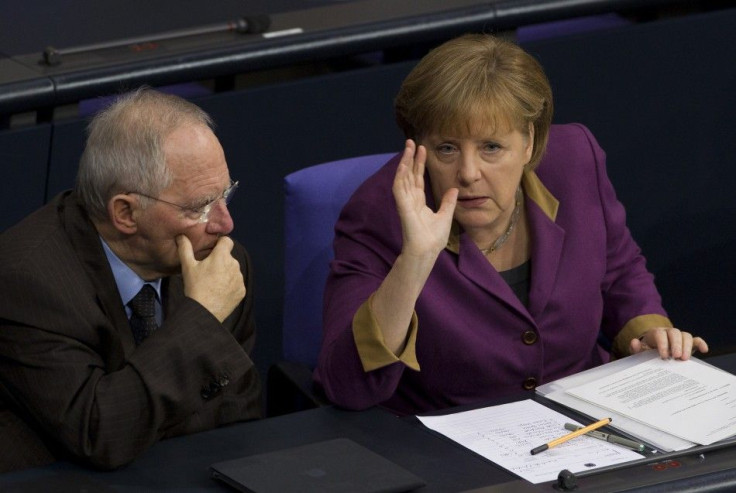German High Court Puts Speed Bump In Merkel Bailout Plan

The highest court in Germany delivered a political blow Tuesday to German Chancellor Angela Merkel and her plans to keep decisions about further European bailouts on the equivalent of a parliamentary fast lane.
Following a complaint from two opposition lawmakers, judges ruled it was unconstitutional to use a nine-member parliamentary subcommittee -- which meets in secret -- to speed decision making on aid to other European states, and that future decisions on the matter should come before larger, more transparent constituencies in the Bundestag.
The court did rule that the smaller panel had the power to make decisions related to a sliver of policy: when and how the German-backed European Financial Stability Facility, the euro zone's temporary bailout fund, could buy other country's sovereign debt notes.
The decision doesn't affect current momentum regarding Greece's €130 billion ($175 billion) bailout, which the wider German Parliament approved Monday.
The court affirms with its ruling the 'if' of the parliament's participation and emphasizes the lower house of parliament's budget policy responsibility, Andreas Vosskuhle, president of Germany's top court, said in the televised decision.
He added that an exemption related to purchasing sovereign bonds was due to reasons of particular confidentiality because even if just the planning of such an emerging measure becomes generally known, it would spoil the success.
While the Federal Constitutional Court's ruling appears to be highly technical -- and deals primarily with decisions that are not yet on the horizon -- it signifies a momentum setback for Merkel and Finance Minister Wolfgang Schäuble. Both officials have been championing the idea Germany should stand ready to quickly provide a backstop to reasonable plans to prevent other euro zone members from defaulting.
Public sentiment in Germany -- Europe's largest economy and the main contributor to various bailout schemes, is quickly turning against providing the financing needed to keep the 17-nation euro monetary union intact, including bailing out Greece.
In the 620-member Bundestag, it's not only the main opposition parties -- the center-left Social Democrats and leftist Greens -- that are turning on the Chancellor. Seventeen members of Merkel's Christian Democrats, who have a majority in the legislative body, voted against bailing out Greece on Monday, in what turned out to be a slim party line vote victory.
Even more of her own party's lawmakers were publicly speaking against the top German executive on the parliamentary committee issue. After the high court decision came out, Norbert Lammert, the speaker of the Bundestag, welcomed the ruling as logical and convincing.
© Copyright IBTimes 2025. All rights reserved.





















